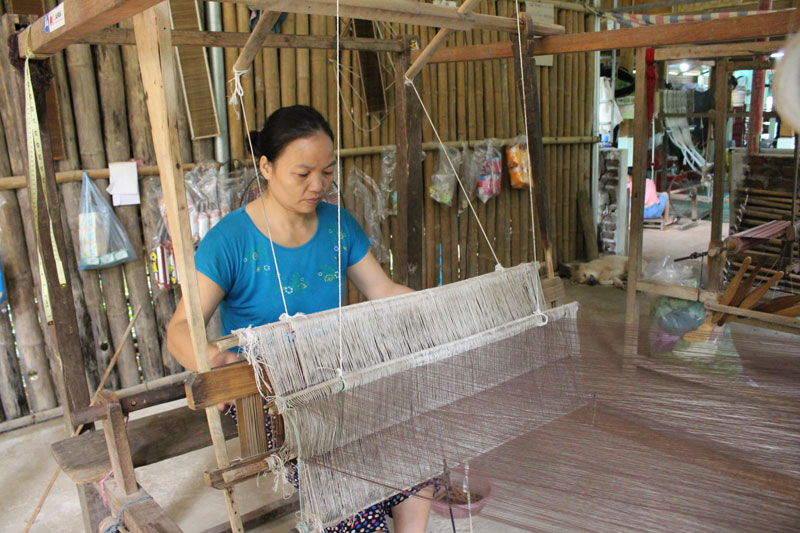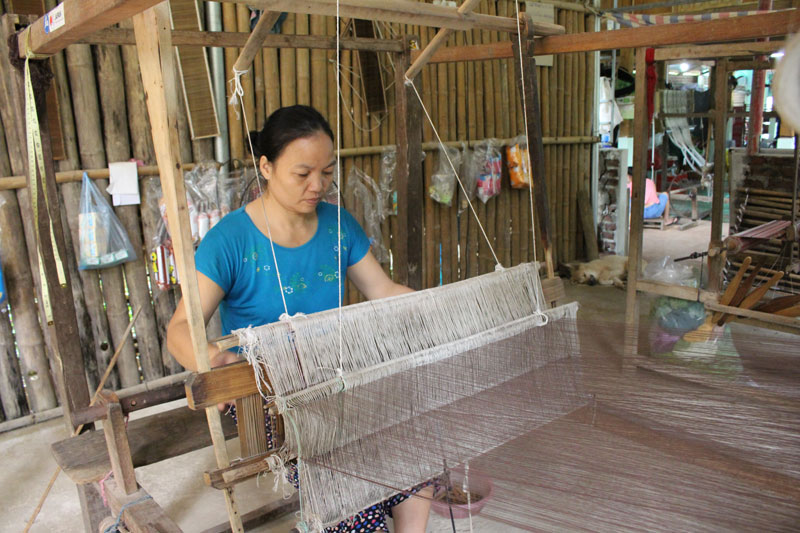
(HBO) - Since the ancient time, Thai ethnic people in Chieng Chau commune (Mai Chau) have preserved brocade weaving. The brocade cloths are a measure of Thai ethnic women's ingenuity. The job of weaving brocade brings the pure value, it is the cultural quintessence of the Thai ethnic people. The products of brocade weaving is used to make home furnishings, dowry for the daughter when she gets married, now is known as a gift for tourists to visit Chieng Chau.
The traditional brocade weaving job became a
feature of the Thai ethnic cultural life here. During the leisure time, Thai
ethnic women are industrious at the weaving looms to create colorful brocade
cloths full of patterns and Thai ethnic characteristics. To develop brocade
weaving, Chieng Chau commune has established 3 Textile sectors: Thuan Hoa
social charity Center (a center of traditional manual weaving and industrial
sewing machines), Thap Khanh textile village and Chieng Chau brocade weaving
Cooperative.

The employees of Chieng Chau Brocade Weaving
Cooperative, Chieng Chau Commune (Mai Chau)
At present, 3 textile sectors of the commune
are operating effectively. Chieng Chau textile co-operative was established in
2009 thanks to the Jica organization to help with machines and training in
embroidery and sewing techniques. In addition, it comes from the passion of
Thai ethnic women with the desire to preserve traditional weaving of Chieng
Chau commune. Ms. Vi Thi Oanh, the Vice Chairman of Chieng Chau Co-operative
said: Currently, the Co-operative operates stably and creates regular jobs for
21 laborers with the income of 2.5-3 million VND / person / month. The products
of the cooperative mainly are bags, wallets, teddy bears, slippers, pillow
cases, in which the best-selling products are bags and wallets. The products of
the cooperative are favored by tourists, are being presented in most festivals,
fairs, and tourist resorts in the province. In addition, the Cooperative has
confirmed its presence in big cities such as Hanoi, Quang Ninh, Da Nang, Quang
Binh, Ho Chi Minh City, etc. Tourists certainly admires from admiring the hands
of skillful women. The visitors explored and walked along Lac Hamlet, under the
floor is the image of Thai ethnic women pounding loom weaving. Tourists can
visit, explore Lac hamlet to choose brocade gifts such as towels, bags, purses,
clothes, etc. There are many items to buy but brocade products are the first
choice of tourists.
With an increasingly vibrant and widespread emulation movement aimed at building cultured residential areas and cultured families, Yen Thuy District has been making steady progress toward improving both the material and spiritual well-being of its people, while fostering a civilized, prosperous, beautiful, and progressive community.
Once lacking recreational spaces and community facilities, Residential Group 2 in Quynh Lam Ward (Hoa Binh City) has recently received attention for the construction of a new, spacious, and fully equipped cultural house. The project followed the model of state support combined with public contributions in both labor and funding.
The "All people unite to build cultural life" movement, which has been effectively integrated with Kim Boi district’s socio-economic development goals, is fostering a lively spirit of emulation across local residential areas, hamlets, villages, public agencies, and enterprises. In addition, through the initiative, traditional cultural values are being preserved and promoted, while community solidarity and mutual support in poverty reduction and economic development are being strengthened.
A working delegation of the Hoa Binh provincial People’s Committee led by its Permanent Vice Chairman Nguyen Van Toan on June 11 inspected the progress of a project to build the Mo Muong Cultural Heritage Conservation Space linked to tourism services in Hop Phong commune, Cao Phong district.
Born and growing in the heroic land of Muong Dong, Dinh Thi Kieu Dung, a resident in Bo town of Kim Boi district, in her childhood was nurtured by the sweet lullabies of her grandmother and mother. These melodies deeply imprinted on her soul, becoming an inseparable part of her love for her ethnic group's culture. For over 20 years, this love for her hometown has driven Dung to research, collect, and pass down the cultural values of the Muong people to future generations.
In the final days of May, the Ethnic Art Troupe of Hoa Binh Province organized performances to serve the people in remote, mountainous, and particularly disadvantaged areas within the province. These were not just ordinary artistic shows, but they were the meaningful journeys aimed at spreading cultural values, enhancing the spiritual life of the people and contributing to the preservation of ethnic minority cultural identities.



